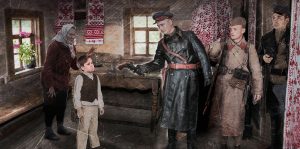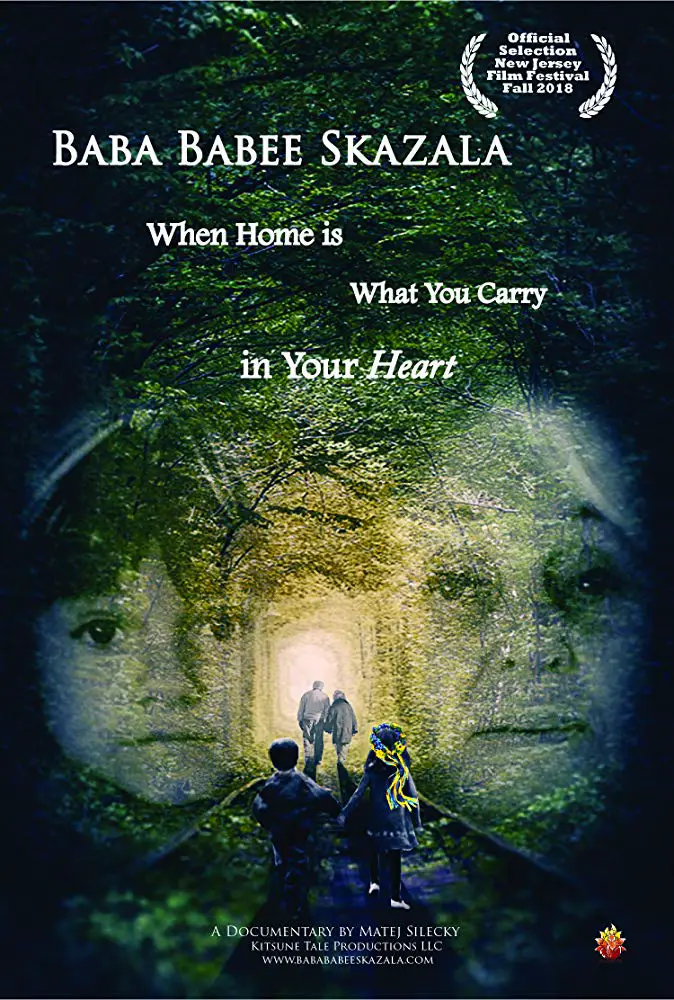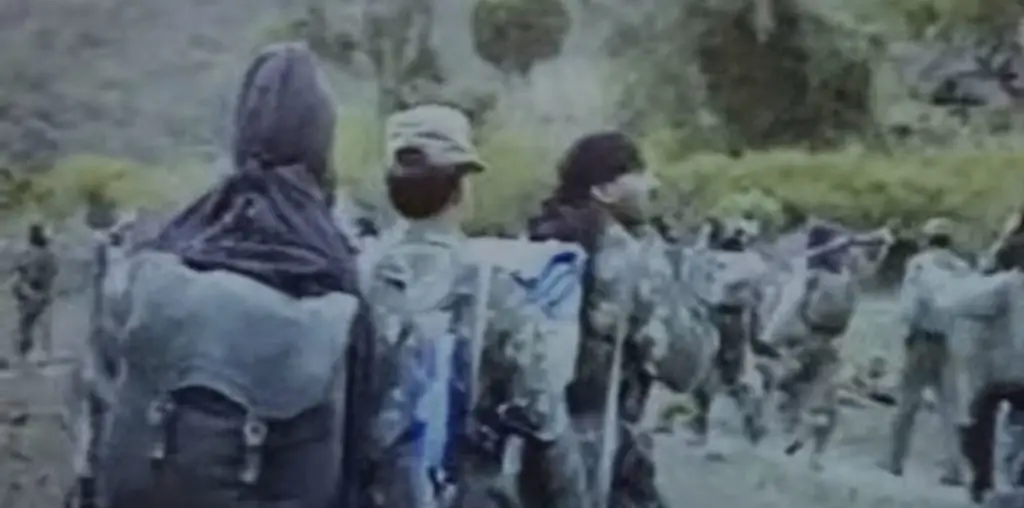
Baba Babee Skazala translates from its native Ukrainian to Grandmother Told Grandmother. The documentary from Matej Silecky takes a look at the not well-known story of Ukrainian refugees displaced during World War II. Specifically focusing on a handful of at-the-time children and exploring how they’ve kept their heritage alive. It follows the beginning invasions of Belarus, through the German forces turning against the Soviets, the end of the war, and the aftermath of the refugees.
Interviews with the survivors- including but not limited to Motyl, Olga Boyko, Volodymyr Horczakiwskj, Alla Heretz, Michael Heretz, Theodosia Fedak- details what they left behind, what they brought with them, and how they acclimated to their new land (most of them wind up in the USA). Silecky does the usual talking heads interview but intersperses them with animated photographs showing the invading forces separating families or killing people. He also uses a map of Europe and tracks his subjects from their hometown to the towns their families fled to. Then from the Displaced Persons Camps that were set up by the Allies at the end of the war to the cities in the USA, they settled down in.
Interestingly enough, those interviewed state that these camps were some of the best times during their childhoods. In a few cases, they were nicer and had more resources than their hometowns. Silecky also interviews a historian and the head of the Ukrainian-American Culture Museum in order to gain perspective, which leads to the first problem of Baba Babee Skazala. It spends so long detailing the horrific events of WWII it does not delve into Ukrainian culture very much. The atrocities of the Holocaust are well-documented throughout every form of media one can imagine. Rehashing them here adds little to the known evils of the Nazis. What it boils down to is that the Nazis displaced and treated Ukrainians the same as they did everyone else.
“…the not well-known story of Ukrainian refugees displaced during World War II.”
It discusses this at the expense of highlighting Ukrainian life. Near the end of the movie, there’s archival footage of people dancing in lovely floral crowns and blue dresses. I haven’t the foggiest idea of what this represents. I am not even positive if this is a traditional Ukrainian thing or not. I know nothing more about the life and culture of Ukraine than I did before starting the movie. Which begs the question, what is this documentary hoping to accomplish? Does it want to discuss the Nazis and their terrible deeds? Given how the film exclusively talks to and is about people from Ukraine, I doubt that is the only aspect at play.
If it is meant to be how the culture of Ukrainian people persevered and survived, shouldn’t it inform the audience about that culture? It fails to do so, to the point where a conversation about flag colors does not make sense. But, meandering in striving to tell the scope of the Nazi occupations and what was lost is understandable. No, what makes Baba Babee Skazala so unengaging is how ineptly told it is. Those animated moments are god awfully rendered. The animation is cheap, poorly colored, and look shoddy. They don’t fit in with the overall aesthetics of the rest of the film and are jarring. The use of black-and-white photographs taken at the DPCs or such places works perfectly in context. Why the need for these animated moments (which look like early motion comics), I do not know.
The maps are another cheap gimmick. While fantastic in theory, the colored lines used to track the speakers’ journeys is cheesy. It appears to have been produced quickly in MS Paint and would look more at home in a middle schooler’s PowerPoint project, not a movie. Again, this cheapens the already middling production value (to be fair, there’s only so much one can do with talking-head interviews).
“…to explore what the immigrants from the Displaced Persons Camps added to the melting pot that is the United States.”
Odd side note. Every single article or official link I have seen for Baba Babee Skazala have listed the film as being 55-minutes long. The link I watched was an hour and 10 minutes in length, including end credits. I don’t know if the film has been shaved down since then, or if it was beefed up and these other reviews (and IMDb) are incorrect. But, 15 minutes is not an insignificant amount of time, and the shorter length could make for a more impactful better-paced watch. Clearly, I don’t know that, as it is not the version I saw, but the discrepancy is worth mentioning.
I am not sure who Baba Babee Skazala is meant for. It is too superficial to inform the audience of what Ukraine lost while under occupation during the Second Great War. It is too meandering to explore what the immigrants from the Displaced Persons Camps added to the melting pot that is the United States. Finally, it is too poorly and cheaply produced to be captivating in any way.

"…“...details what they left behind, what they brought with them, and how they acclimated to their new land…”"

